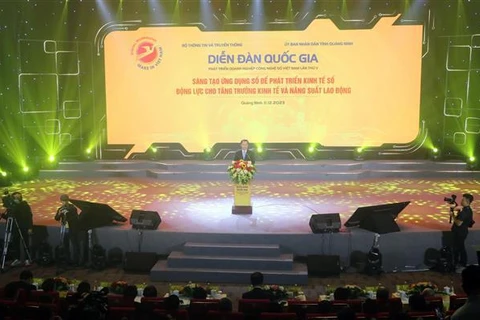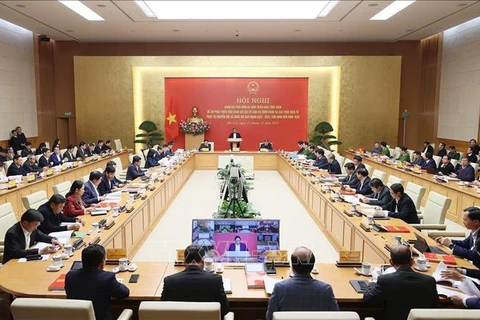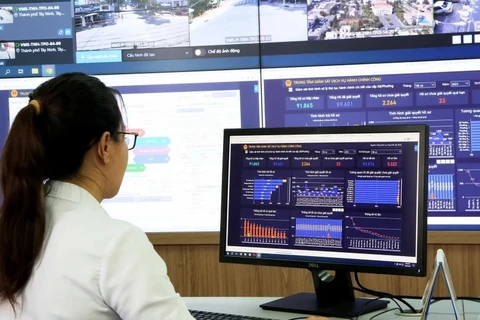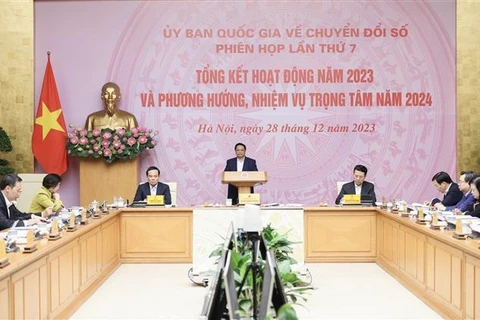 Deputy Minister of Information and Communications Nguyen Huy Dung addresses the meeting (Photo: VNA)
Deputy Minister of Information and Communications Nguyen Huy Dung addresses the meeting (Photo: VNA) Delivering a report on the 7th meeting of the National Committee for Digital Transformation on December 28, Dung said that this year, the World Intellectual Property Organisation (WIPO) has placed Vietnam in the 46th position out of the 132 countries and territories in terms of Global Innovation Index (GII), two places higher than the 2022 rankings, enabling the country to secure its position among the 50 leading countries in the field since 2018.
Meanwhile, an e-Connomy SEA report released recently by Google, Temasek and Bain & Company showed that Vietnam remains the fastest growing digital economy in Southeast Asia for a second year in a row and is expected to hold this position until 2025, the official noted. Particularly, digital payments expanded 19%, making Vietnam the fastest growing country in Southeast Asia in the field.
He highlighted the country’s fruitful outcomes in administrative reform and online public service provision, including the cutting and simplification of nearly 2,500 business regulations in 201 legal documents, the erasing and simplification of 528 out of the 1,086 administrative procedures.
Deputy Minister Dung said that in the year, State agencies have put seven national databases into operations. In the 2021-2023 period, the Ministry of Information and Communications (MIC) directed telecommunications businesses to provide mobile coverage in 2,433 out of the 2,853 service-lacking areas.
Currently, Vietnam has 13 data centre service provider and 45 data centres with nearly 28,000 racks, he said, adding that the country has 1.5 million workhands in the field of information technology and digital technology.
The MIC has issued a programme to encourage the use of national digital platforms, he said, noting that to date, eight have been announced, drawing 150 million regular users each month.
Meanwhile, the safety level of 2,074 out of the 3,192 systems, or 65%, has been approved. The MIC has launched a management support platform to assist agencies and organisations in ensuring safety of their information systems.
At the same time, the ministry has checked and labeled 4,770 websites as trustful network, including 3,823 websites of state agencies. Authorities have blocked 9,073 websites that violate the law, including 2,603 fraudulent websites, protecting more than 10.1 million people from accessing infringing and fraudulent websites in cyberspace. The ministry also requests ministries, sectors and localities to deploy network trust labeling for 100% of websites under their management no later than the second quarter of 2024.
According to the MIC, by the end of 2023, 81% of administrative procedures have been provided online, while the rate of administrative procedures processed online has reached 38.3%, saving 37 million working hours for the people, equivalent 1.27 trillion VND (52.31 million USD)
Vietnam's digital economy has continued to grow rapidly at a rate of about 20%, three times faster than GDP growth. However, this growth rate is forecast to slow down in the next few years.
The ministry has identified the digital economy as a new and potential space for sectors, raising digital economy’s rate in the national economy to 20% by 2025 and 30% by 2030. Five promising sectors in the field are agriculture, tourism, garment and textiles, logistics, and processing-manufacturing.
Deputy Minister Dung said that in 2024, Vietnam must focus on finding new space and new development motivations to boost economic growth and labour productivity. In the year, the MIC will concentrate on universalising digital infrastructure and create digital applications to develop the digital economy, he stated, clarifying nine major tasks in digital infrastructure and five in universalising the foundational elements for the digital economy. It will order telecommunications enterprises and digital technology firms to solve six major problems in creating digital applications, the official added./.
VNA























